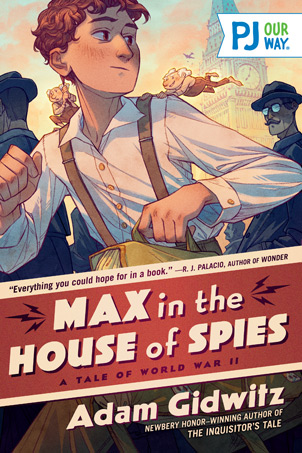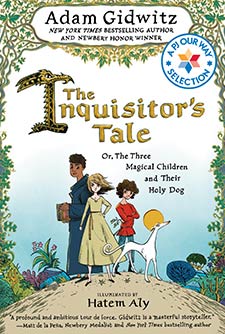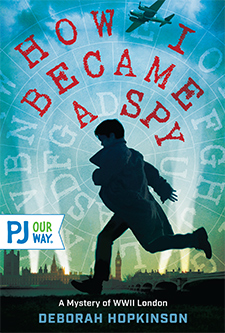Max in the House of Spies
It’s the summer of 1939 and Max has just lost his home, his country, and his parents. Luckily, he’s also found Berg and Stein. Or did they find him? Either way, his life is about to get a whole lot weirder.
Average Rating
( hint: Login to leave a review! )
74 Reviews
Leave Review
What the Book Is About
Jewish Content and Values
Content Advisory
It’s 1939, and 11-year-old Max is sent alone on a Kindertransport from Berlin to live with a Jewish family in London. Fortunately, he’s not alone - Max is surprised to discover that he’s been joined by two unexpected traveling companions, one on each shoulder, a kobold and a dybbuk named Berg and Stein
Over time, Max loses his German accent and learns how to get along at school—at that time, antisemitism and anti-German sentiment were very common in England.
When the Blitz starts in September of 1940, the family moves to the country, where Max tries to convince a senior army official to send him back to Berlin as a spy and to find his parents. After a prank involving the wireless radios in the Admiral's car, Max is taken for interrogation and eventually accepted into a spy training program. With the help of the dybbuk and goblin, Max passes his psychological testing, is given a mission, and is sent to Berlin. Max lands in Nazi territory and the book ends on a cliffhanger, setting up a sequel. An extended author's note at the end adds important historical context.
-
Many of the characters are Jewish, including Max, the Montagus, Lord Rothschild, and Stein, a dybbuk (a spirit that possesses the body of a living person) who uses Yiddish phrases.
-
Max's pranks and problem-solving skills are excellent examples of Yiddishekop (creative thinking).
-
There are two Shabbat dinner scenes, one with the Montagus and one with Lord Rothschild.
Max in the House of Spies takes place during World War II and the Holocaust, with multiple references to the antisemitism and violence that Jews faced during that time. While there are no graphic images in this book, there are mentions of death camps and gas chambers, and the horrors that Jews – including Max’s father -- endured there. Max remembers Kristallnacht, when his rabbi was thrown through a glass window. There are several bullies in the story, ranging from fellow students to antisemitic teachers and Nazi soldiers. As part of his spy training, Max learns to fight, and his trainers decide not to give him a suicide pill even though he might be captured and tortured. Finally, there is some strong language, including "damn" and "hell" and antisemitic insults, such as "Yid."
What the Book Is About
It’s 1939, and 11-year-old Max is sent alone on a Kindertransport from Berlin to live with a Jewish family in London. Fortunately, he’s not alone - Max is surprised to discover that he’s been joined by two unexpected traveling companions, one on each shoulder, a kobold and a dybbuk named Berg and Stein
Over time, Max loses his German accent and learns how to get along at school—at that time, antisemitism and anti-German sentiment were very common in England.
When the Blitz starts in September of 1940, the family moves to the country, where Max tries to convince a senior army official to send him back to Berlin as a spy and to find his parents. After a prank involving the wireless radios in the Admiral's car, Max is taken for interrogation and eventually accepted into a spy training program. With the help of the dybbuk and goblin, Max passes his psychological testing, is given a mission, and is sent to Berlin. Max lands in Nazi territory and the book ends on a cliffhanger, setting up a sequel. An extended author's note at the end adds important historical context.
Jewish Content and Values
-
Many of the characters are Jewish, including Max, the Montagus, Lord Rothschild, and Stein, a dybbuk (a spirit that possesses the body of a living person) who uses Yiddish phrases.
-
Max's pranks and problem-solving skills are excellent examples of Yiddishekop (creative thinking).
-
There are two Shabbat dinner scenes, one with the Montagus and one with Lord Rothschild.
Content Advisory
Max in the House of Spies takes place during World War II and the Holocaust, with multiple references to the antisemitism and violence that Jews faced during that time. While there are no graphic images in this book, there are mentions of death camps and gas chambers, and the horrors that Jews – including Max’s father -- endured there. Max remembers Kristallnacht, when his rabbi was thrown through a glass window. There are several bullies in the story, ranging from fellow students to antisemitic teachers and Nazi soldiers. As part of his spy training, Max learns to fight, and his trainers decide not to give him a suicide pill even though he might be captured and tortured. Finally, there is some strong language, including "damn" and "hell" and antisemitic insults, such as "Yid."




